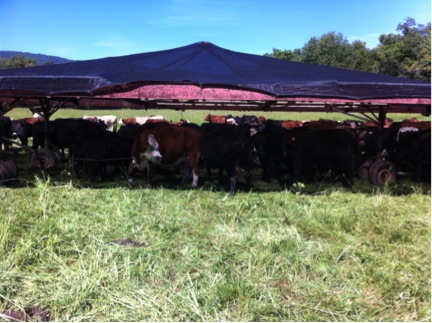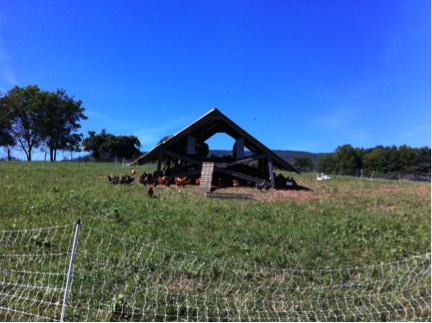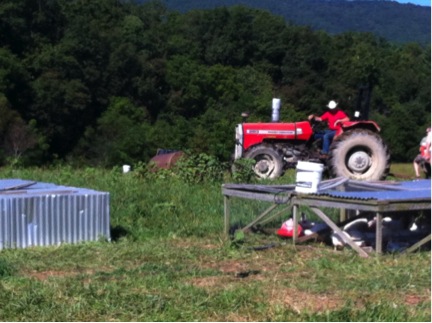Who knew a farm could be so interesting? Coracle gathered a group of us for a tour of Polyface Farm in August, where they are taking a lead from God’s design of nature to produce delicious food, excellent in every respect.
Polyface, nestled in a beautiful area of Virginia’s Shenandoah Valley, is owned and operated by Joel Salatin and his family. Our group loaded up with about 100 other people onto tractor-pulled hay wagons on a magnificently sunny day for a tour of the farm led by Joel’s son Daniel.
The farm covers over 500 acres, across forest, creeks, and pasture land. They raise livestock – cattle, pigs, broiler chickens, egg-laying hens, rabbits, turkeys – and we saw them all.

(Cows enjoying the mobile shade, which helps keep their impact focused on the pasture; Credit – Jim Presswood)
What impressed us most is how Polyface follows God’s natural design in their use of the pastures. Daniel explained to the tour participants how herbivores in the wild are always on the move, which is good for both the health of the animals and the plants they eat. Polyface mimics this pattern for their cattle by easing them across pastures over the course of a year, using portable electric fencing.
Cattle are moved on a daily basis to a new section of pasture for what the Salatin’s call a “fresh salad bar.” The fresh grass is good for the cattle because the upper part of the plant contains most of the carbohydrates, which provides the best nutrients for them. The grasses also benefit because they grow most efficiently when they are thus “mowed” by herbivores, but not eaten all the way down to the base of the plant. The cows’ hooves create indentations perfect for retaining moisture.
Herbivores in the wild are accompanied by birds that “sanitize” the manure by eating bugs and spreading it out. Polyface simulates this phenomenon with their egg mobile, which is a 12 ft. x 20 ft. portable henhouse that pulls in about three days after the cattle, which is just in time for a busy army of laying hens to scratch and peck out the insect larvae in the cow patties before they hatch into flies.
The final visitors to the grazed section of pasture are the broiler chickens, which are housed in roomy cages with open floors. They like eating the shorter grasses and the occasional grasshoppers that pass through. Polyface migrates the cages across the pasture on a daily basis to give the chickens a fresh salad bar while minimizing their impact on the pasture.
A grazed pasture then quickly regrows and the cycle starts again. This cycle is an elegant balance with many benefits. The farm is, as the Salatin’s like to say, “aesthetically and aromatically pleasing” (typical manure smells – as you would associate with feedlots or chicken houses – are God’s way of telling you to do things differently, according to Joel). The animals are treated humanely and with respect; Joel is often quoted for respecting “the pigness of a pig” or “the chickeness of a chicken,” meaning that by allowing an animal to engage in its natural behaviors, we can harness those activities the animal positively enjoys – such as pecking larvae out of a cow pie – to assist the farmer with his labors.
The intricate sequencing of various animals across the same section of pasture not only promotes ideal pasture and optimal animal health, but also creates separate, diversified revenue streams that greatly enhance the per-acre productivity of the farm.
The wonderful example Polyface sets for good stewardship stands in stark contrast to the vast majority of our county’s industrial agriculture system, which relies almost entirely on concentrated animal feeding operations (CAFOs) to produce food. The horribly inhumane and environmentally harmful practices of CAFOs are well described in Michael Pollan’s book Omnivore’s Dilemma and Matthew Scully’s Dominion.
Our tour of Polyface only just begins to describe what is happening on their farm. You can learn more by reading Joel’s recent book Folks, this ain’t normal. And, better yet, heading out for a tour of the farm, located just outside of Staunton, Virginia.
It is our hope and prayer that the number of farms like Polyface will grow rapidly across America. When families like the Salatin’s set out to glorify God, using their heart, soul, mind, and muscle, it’s amazing how everything falls into place: beautiful farm, contented animals, and exceptionally tasty, nutritious food.


